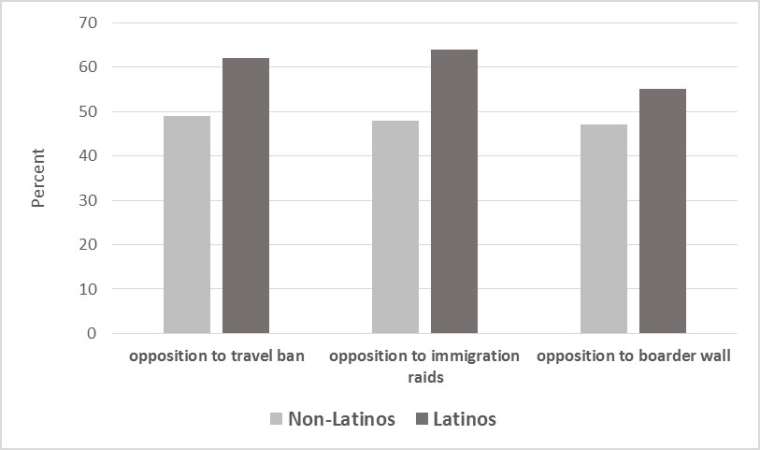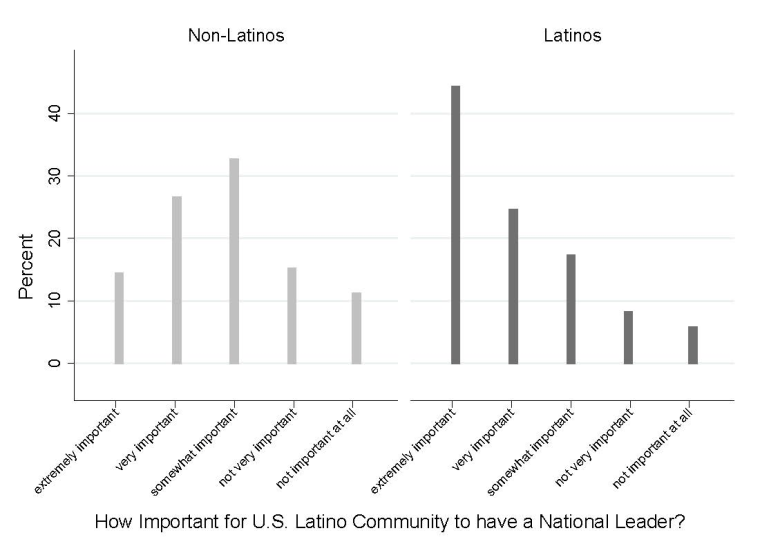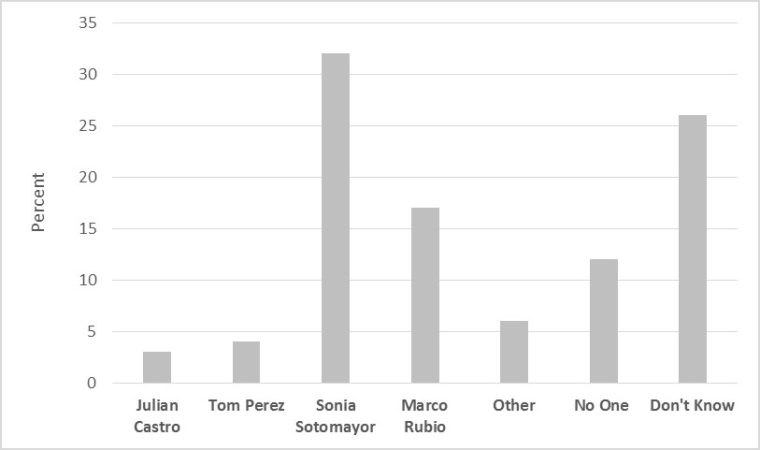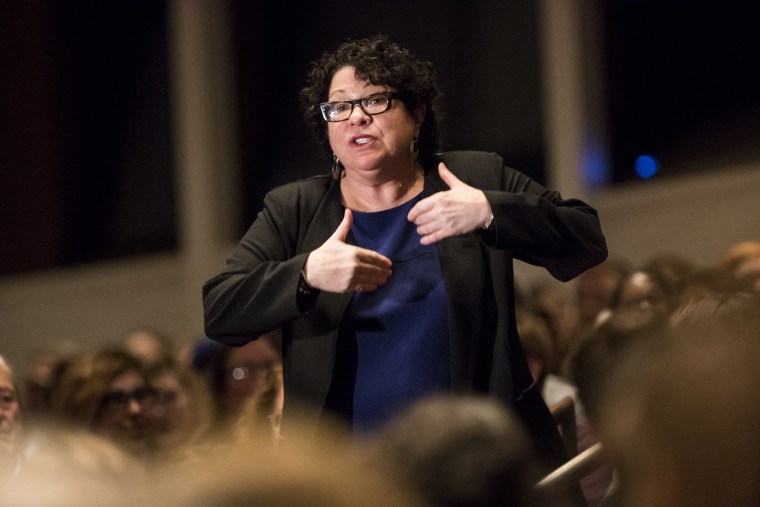Who is standing up for Latinos?
The Urban League's recent annual report noted that while African Americans and Latinos have made strides on economic and educational indicators, they still lag significantly behind whites. The CEO of the Urban League, Marc Morial, cautioned that, “...any progress made toward racial equality is increasingly under threat.”
This caution is particularly timely for Latinos, who are watching the implementation of Trump administration policies that go against their general interests, according to our recent poll, and who lack a meaningful way to respond.
Particularly noticeable is the absence of prominent leadership capable of mobilizing Latinos and making their case nationally.
Objections among Latinos to Trump-led policies are of course not surprising, since a majority of Hispanic voters overwhelmingly supported Hillary Clinton over Donald Trump in the 2016 election. However, even with a Republican administration, Latinos, given their size, should have prominent voices in and around government, and their preferences should inform a large part of the debate.
One of our latest University of Maryland Critical Issues Poll (fielded by Nielsen Scarborough April 12 to 17, sample size 2,138 and with a margin of error ±2.12 percent) reveals that Latinos continue to be much more opposed than non-Latinos to policies that disproportionately affect minorities, such as the travel ban, immigration raids and building the border wall. More than 50 percent of Latinos oppose each of these three policies.

Many Latinos perceive Donald Trump’s platform to be anti-immigration and by extension, anti-Latino, which breeds skepticism that their interests will be advocated for or represented within the administration. In fact, Donald Trump has only tapped one Latino to serve in his cabinet—Alexander Acosta as Secretary of Labor—and only after Trump’s first choice for the position, Andrew Puzder, withdrew his nomination.
When asked whether Hispanics were well represented within the Trump administration, only 10 percent of Latinos in our survey said they were “very well represented” in the administration, while 16 percent said they were “somewhat represented.” In contrast, almost four in ten Latinos (39 percent) said they were “not represented at all”, and another 36 percent said they were “not very well represented.”
With almost three-fourths of Hispanics expressing a lack of representation within the current presidential administration, do they have a prominent voice or group of voices that will stand up for their interests? Before addressing this question, a little context is in order.
RELATED: Latino Leaders: Trump Did Not Win 29 Percent of Hispanic Vote
Latinos have historically lacked an identifiable national leader or group of leaders, even in light of their rapid population growth. This is due in part to their diverse backgrounds and varying interests. However, as my research shows, Latino group diversity does not preclude common and identifiable group interests such as immigration, education, and healthcare.
By contrast, African Americans have been much more united in their prevalent concerns and have a long history of nationally prominent leaders. Their leadership history goes back to the era of slavery, through the Civil Rights Movement, and continues to this day. From Frederick Douglass to Booker T. Washington, to Rosa Parks and Martin Luther King, Jr. to Jesse Jackson and Barack Obama, African American history is replete with leaders who have advanced the interests and demands of their group.
Beyond perhaps Cesar Chavez, the labor leader and civil rights activist who was conspicuous in the 1960s and 1970s, it is difficult to gain any consensus among Latinos on what individuals or group of individuals have been nationally visible leaders of their community over the past forty years. Even when we discuss collective leadership for African Americans, we can point to national and prominent organizations such as the NAACP or the Urban League as influential voices in the plight of this group.
While there are organizations that specifically advocate for the interests of Latinos, like the National Council of La Raza and the National Hispanic Leadership Agenda, none have reached the stature or influence of those that have promoted the causes of African Americans.
The lack of identifiable leaders, however, does not mean that Latinos do not think it is important for such a person to exist.
In our Critical Issues Poll, we asked respondents, “In your opinion, how important is it for the U.S. Latino community to have a national leader advocating for the concerns of Latinos?”
Our results show a robust 43 percent of Latinos said it was “extremely important” for Latinos to have a national leader and another 23 percent of Latinos said it was “very important.” In contrast, only 14 percent of non-Latinos said it was “extremely important” for Latinos to have a national leader, and 25 percent said it was “very important.”

There is clear divergence between Latinos and non-Latinos on the importance of a national leader for the U.S. Hispanic community.
Often, non-Latinos (and non-group members) believe that minority group members can receive equally as good advocacy from non-Latino leaders.
My research also shows that the Latino community not only desires leadership from its own members, but in many circumstances, Latinos receive better advocacy from those who share their identity.
RELATED: Survey: What do Latino Leaders Think of Clinton, Trump, 2016?
Knowing, then, that two-thirds of Latinos believe it is extremely or very important for them to have national leaders who share their identity, who do they say fills this role in present day? Here again, our recent survey is quite revealing. Asked, “In your opinion, who is the most important Latino leader in the country today,” the graph below shows that a plurality of Latino respondents (38 percent) said either “no one” or they “don’t know.”
Our poll shows that there is a clear lack of consensus on a national leader among Hispanics. Of the choices provided in the question (“who is most important Latino leader”) 32 percent of Latino respondents selected Supreme Court Justice Sonia Sotomayor, while another 17 percent chose Florida Republican Senator and former presidential candidate, Marco Rubio, and 4 percent chose current chair of the Democratic National Committee and former Labor Secretary, Tom Perez.

We also asked an open-ended question of Latino respondents who selected “other” as the most important Latino leader. Only Ted Cruz registered with double-digit responses. Other responses ranged from Spanish T.V. news anchor Jorge Ramos to the musician, Carlos Santana.
These survey results reveal several important findings.
First, Latinos have difficulty coalescing around a prominent Latino leader. In fact, most respondents say such a leader either does not exist, or they do not recognize their presence.
Second and perhaps equally as important, several of the “leaders” identified by Latino respondents are not necessarily recognized for advancing Latino interests, specifically, but more so for being visible Latinos in prominent positions. This is an important distinction; Sonya Sotomayor, for example, is tasked with defending the Constitution, first and foremost, and not the interests of the ethnic group she belongs to.
The void in Latino national leadership is nothing new and perhaps not so surprising, given the diversity of group characteristics and group interests. However, in light of their ever increasing numbers, at a time when Latinos need a prominent and influential voice to promote their interests and oppose detrimental policies, the deficit in Latino leadership is all the more striking. Without individuals that can stand up against the current political environment, Latinos will likely continue to find themselves marginalized.
Stella M. Rouse is an Associate Professor of Government and Politics and Director of the Center for American Politics and Citizenship at the University of Maryland. Follow her on Twitter @Stella_Rouse.
